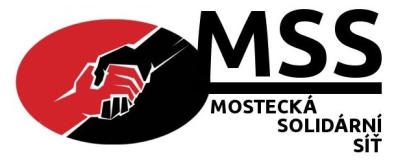29/08/2013
We are happy to announce that the conflict with Zepter International Ltd. in the Czech Republic, in which Priama akcia actively participated, ended up in a victory for the MSS. In May 2013, the MSS were contacted by Žaneta, who worked for Zepter. She asked for help after her local manager Jiří Ozaňák had refused to pay her commissions she was entitled to. In a fraudulent way he had transferred them to the account of his relative Karolína Ozaňáková. The management of the company refused to address the problem and disputed its existence. Only after a series of collective direct actions the commissions were paid out. What follows is a description of the conflict from the beginning to its victorious end, including reflections on its significance for the future, written down and originally published by MSS.
First contact, defining the goal and handing over the letter with demands
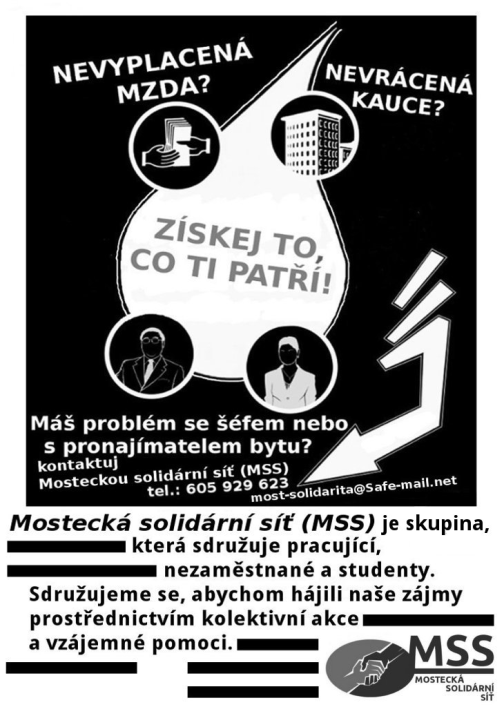 At the very begging of the MSS activities, there was postering in the streets of Most. Through the posters MSS offered help to those who had problems with bosses or landlords. One of the posters caught the attention of Žaneta, who called us, and we agreed a meeting.
At the very begging of the MSS activities, there was postering in the streets of Most. Through the posters MSS offered help to those who had problems with bosses or landlords. One of the posters caught the attention of Žaneta, who called us, and we agreed a meeting.
At the first meeting, we asked Žaneta to explain the problem in detail. After we learned the essential facts, our group decided to support Žaneta in her struggle to get the money she had earned.
The first step was to define the main goal together with Žaneta – to have her commissions paid out as soon as possible. A letter with this demand and an ultimatum of seven days for the payout was handed over by her, accompanied by our group, to the manager who stole the money. We could clearly see in Ozaňák’s face that he was unpleasantly surprised by the presence of our collective. While he had often yelled at Žaneta and humiliated her at work, this time he just silently read the letter.
Afterwards, the letter was also sent to the company management. Whereas Ozaňák did not reply to the letter, the management sent us an e-mail signed by Marcela Dolanová, the director of the regional branch of the company. She explained that the case had been given to a competent person who is supposed to find a solution. In our response we pointed out that with regard to the seriousness of the situation, we consider further delays unacceptable. However, no commissions were paid out and Zepter kept silent for several days.
Protest e-mails
While Zepter did nothing, the MSS realized and planned further steps. On 19th June 2013, alerta.cz published a call to send protest e-mails to the management of the company. The call was published not only in Czech, but also in English, and many people reacted. E-mails were sent from the Czech Republic, Germany, Slovakia, Spain, USA, Portugal, Poland, Norway, Canada, UK and Italy. Later, the same call was published also in French and German, and the response was good as well.
Information about the conflict appeared also on websites of our foreign friends and their organizations, e.g. Priama akcia (PA-IWA Slovakia), libcom.org, Confédération Nationale du Travail (CNT-F) and Die Freie Arbeiterinnen und Arbeiter-Union (FAU–IWA Germany).
Of course, we have no illusions that protest e-mails alone can put enough pressure on the company. However, in the context of the overall struggle, it is an important step. Protest e-mails were without doubt a significant signal that many people would be ready to support Žaneta’s struggle if necessary.
It was easy to send a protest e-mail and we would like to thank those who sent them. The large number of e-mails was important also to us, because it motivated us even more to continue organizing direct actions. We were also happy about the offers to organize protests in front of Zepter branches abroad, which would be the next step, if the company kept on refusing to fulfill our demand.
The company was disconcerted by the fact that we published the information and called for solidarity (after the first direct actions it must have been clear to them that Zepter would find itself in an unpleasant situation not only in the Czech Republic) and the management decided to react. However, they chose a very unfortunate way.
The lawyer’s reaction
On 21st June 2013, Zepter’s lawyer sent us an e-mail, in which he called our claims untrue and misleading. Not only did he question the payout of Žaneta’s commissions. He also stated that the money was transferred to another account based on her request. Evidently, the company did not intend to deal neither with Žaneta’s statement that she never made such a request, nor with her suspicion that the request was fraudulently written by Jiří Ozaňák, who then transferred the money to the account of his relative Karolína Ozaňáková.
The general impression from the lawyer’s letter was that he aimed to hide the problem and threaten and discourage us from further actions, rather than solve the situation. If the management thought they could discourage us with threats of lawsuit, they were very wrong. Quite the contrary, the lawyer’s letter reinforced our opinion that our next step – direct actions – should follow soon.
Protest in Most
Our decision to organize direct actions instead of going to court had clear reasons. Relying on courts would have meant that we would have given power over the process, tactics and results of our struggle to others (judges, lawyers…) and lose control over it. In contrast, direct action allows us to be the driving force and collectively decide about every step that leads us to the aim. Instead of the principle of representative power we advocate direct activity stemming from the organizational initiative of the collective. Our choice was thus obvious: collectively put pressure on the vulnerable spot of the company – the spot where profit is created. In the case of Zepter, it was the branches, which are in direct contact with the customers.
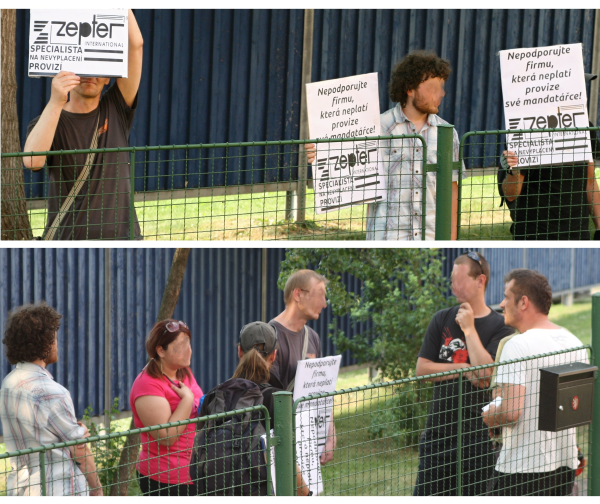 We were able to find out when the next presentation of Zepter products would be organized in the local branch. On that date (9th July 2013), we mobilized part of our group and gathered in front of the company premises with placards and flyers. We protested against the practices of the company and informed the passers-by about the conflict. There were three people from Zepter – two women and a manager Jan Liška. All three were surprised and a rather emotional “debate” followed.
We were able to find out when the next presentation of Zepter products would be organized in the local branch. On that date (9th July 2013), we mobilized part of our group and gathered in front of the company premises with placards and flyers. We protested against the practices of the company and informed the passers-by about the conflict. There were three people from Zepter – two women and a manager Jan Liška. All three were surprised and a rather emotional “debate” followed.
Jan Liška repeated the same false claims as the lawyer. Despite Žaneta’s objections, he insisted that she herself had asked for the change of the account number where the commissions had then been sent. As both Žaneta’s and Ozaňák’s superior, he could have verified the facts and uncover the fraud. Instead, he repeatedly claimed that the request was based on the agreement of Žaneta and Ozaňák. When we asked him to show us the written request, he said to ask other company bodies that have competence to show such a document. He said that he would at least send information proving that Zepter paid out everything Žaneta was entitled to. Nevertheless, he sent nothing.
Then, Žaneta requested the company to send her a copy of the alleged request to change the account number. Again, she received no response. Zepter reacted by keeping quiet.
Direct action in Prague
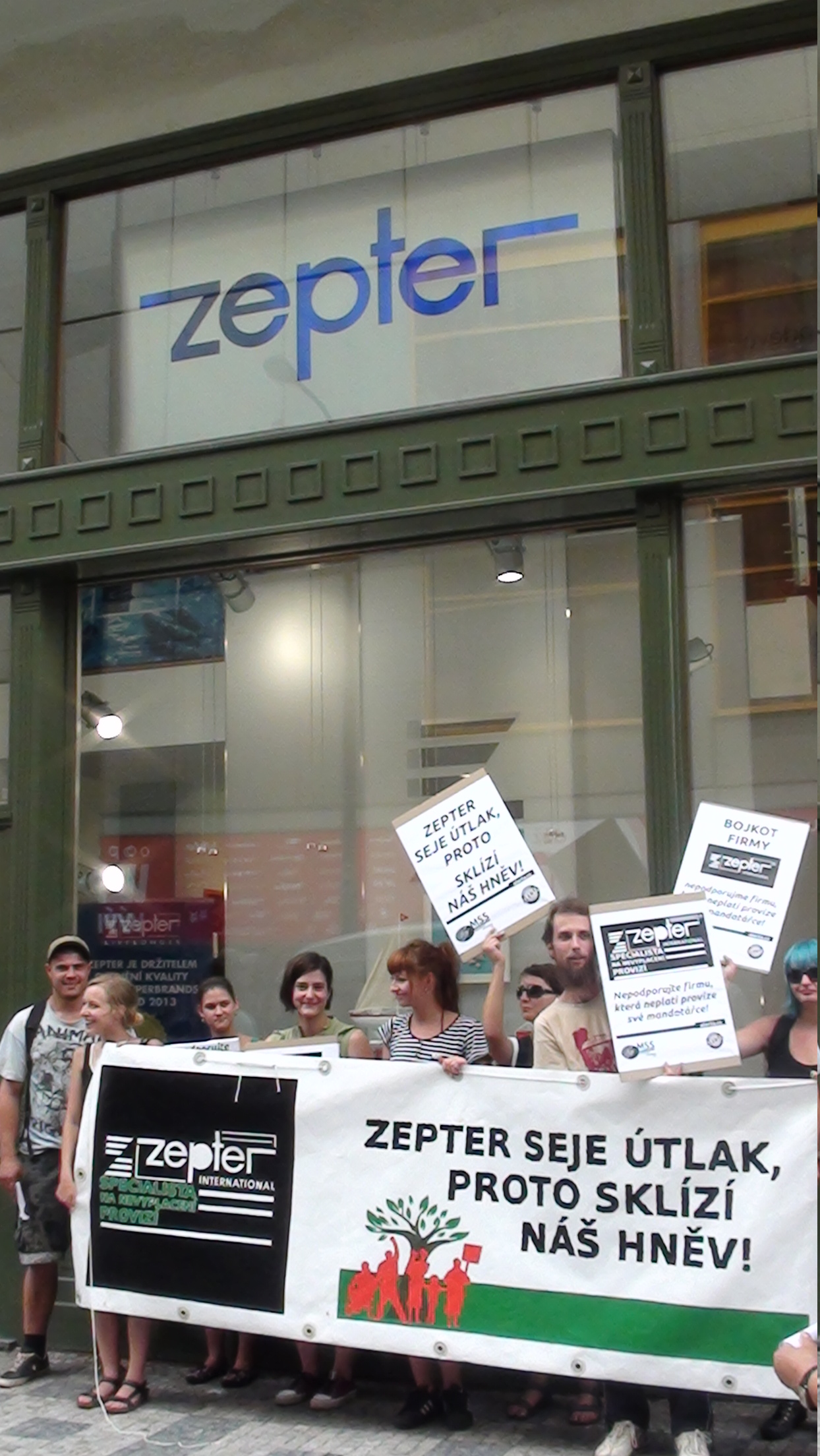
While the protest caused a commotion among the people from Zepter (especially when they saw that leaflets were being spread and speeches held with a bullhorn), most passers-by responded positively. Some people even decided to stay with us and take part in the action.
After a while, Petr Uhlík from Zepter approached us and offered us a meeting with company representatives. Until then Zepter avoided direct contact with us. Therefore we considered this proposal to be the first concession made by the company. However, we needed to consult it with the whole group. Together with internal discussion about a possible meeting, further actions took place so that the pressure on the company did not weaken. The next protest took place to the dismay of Zepter on the very next day at the same place.
Direct actions in Brno (Czech) and Bratislava (Slovakia)
On Thursday, 8th August 2013, an action took place in front of the Zepter store in Brno. Although it is not located on a busy street, we talked to many people who listened and often openly expressed their support for our efforts. Our protest was not pleasant for the people in Zepter. They even knew about the protest that happened on the same day in Bratislava.
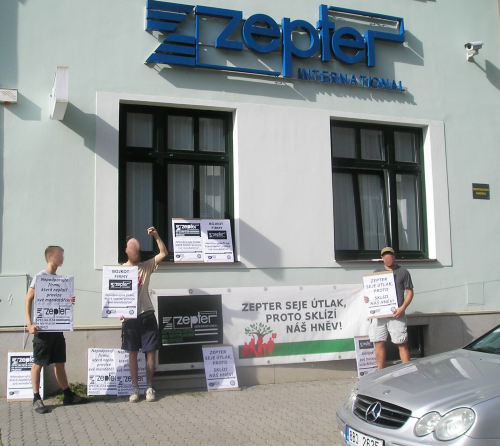
The protest in Bratislava was organized by the local group of Priama akcia (PA). It took place in front of the company’s store which is situated in a business centre. Many passers-by noticed the action and expressed their support.
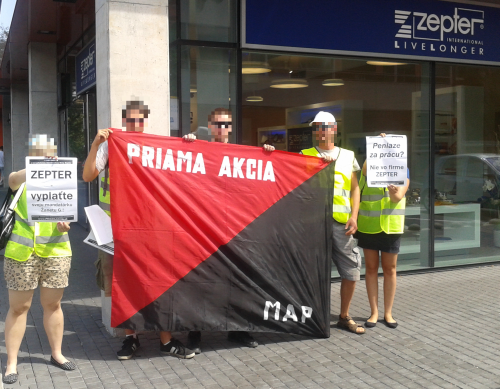
The victory – Zepter acknowledge their fault and pay out the commissions
Another direct action was organized in Brno again the next day. As it soon proved, no further actions were necessary as the general director of Zepter Michal Jílek called us. First he appealed to end the protests and arrange a personal meeting with the representatives of the company as soon as possible. Upon learning that further protests are possible, Jílek made a big concession. He finally acknowledged that Jiří Ozaňák illegally transferred Žaneta’s commissions to the account of Karolína Ozaňáková. What followed was an apology and a promise that the commissions in the amount of 6 782 Kč (app. 260 EUR) would be transferred to Žaneta’s account on the same day. The general director of Zepter kept his promise. It was clear that the conflict would end with our victory.
A few days later a meeting took place in Most with three representatives of Zepter including the general director Michal Jílek and the manager Jan Liška, and MSS members. We discussed mainly the difference between the demanded sum of money and the actual amount that was paid out. The difference was caused by untrue and misleading information about the commissions system given to Žaneta by Jiří Ozaňák. He didn’t give her all the necessary information which resulted in a wrong calculation on behalf of Žaneta.
However, the calculation error does not change the fact that the company had not paid Žaneta everything she was entitled to and the management of Zepter had not showed any inclination to deal with the situation. On the contrary, the company repeatedly claimed that all the commissions were paid out. It’s absolutely clear that the management acknowledged the problem and resolved it only thanks to our pressure activities. There is no doubt that without them, Žaneta wouldn’t get the money. Ozaňák’s fraud would have stayed hidden and the management would have acted as if everything was alright.
The management of Zepter could tend to blame Jiří Ozaňák for everything and wash their hands over the conflict. Nevertheless, they cannot deny that it was not down to a failure of one individual, but many other people across the company structure. First and foremost, it was a failure of the internal company policy that allowed for such a fraud to occur. Additionally, Zepter’s passivity and unwillingness to solve the problem caused the conflict to last several months. It could have been easily solved very fast.
When a small group does big things
We have brought Ozaňák’s fraud to Zepter’s attention several times during the conflict but only after the company’s profit and image were threatened, Zepter started to deal with the situation and paid out the money. It proved correct that when actions are aimed at sensitive spots, even a small group of dedicated people can defeat such a giant like the multinational corporation Zepter. Our practice showed that to win, one does not need an organization with a lot of members, but rather a lot of determination, self-confidence and a strategy of direct actions.
Context of the struggle
Practices like unpaid wages stem from the relations in capitalism and are nothing exceptional. If we do not organize, it is easier for bosses to steal, humiliate and exploit us. In the conflict with Zepter, we showed that it is possible to fight back and get what we want when we act collectively.
We gained experience which will help us to be better prepared in the future. A lesson learned from practice is always a more solid building stone than theoretical theses learned from texts. In this case, it is a lesson learned from activities that can be easily repeated anywhere in the Czech Republic or other parts of the world. Now we know that our strategy works even in small numbers. We also know that it is not financially and organizationally demanding. There is no reason not to use our experiences and achieve more victories, which could be even more significant.
Self-confidence and determination
In addition to the lessons learned, there is also an important motivational effect that showed itself during the struggle and grew even bigger afterwards. A victorious conflict becomes a driving force, making us more determined to get involved in the next conflicts. Our self-confidence increases with each victory, which frees us from feelings of powerlessness and instead stimulates our belief that organizing makes sense.
The question of self-confidence is very important for us. Before we started the MSS, there were self-conscious voices of our friends saying that creating an effective solidarity network in Most is doomed to fail. “We are not living in a country with a deep-rooted culture of resistance,” they added. If we had listened to them, our “activity” would have restricted to passively waiting for better future that would never come. However, we struggled and our self-confidence as well as determination to start even bigger conflicts in the future increased.
Mutual aid and cooperation
The conflict of MSS with Zepter showed that to solve problems collectively means to solve them effectively, and to solve them individually means to be in a disadvantageous and vulnerable position, which the other side gladly uses for their benefit. When Žaneta acted individually, the management did not feel the pressure that would force them to act. This pressure materialized only after she started to act as part of the MSS collective.
We would welcome if you contact us (as Žaneta did) in case you or someone you know have problems at work and would like to solve them. Our group would gladly offer our organizational skills or contacts to other groups in Czech Republic or abroad. You can contact the MSS by phone: + 420 605 929 623 or e-mail: most-solidarita(at)safe-mail(dot)net.
People in Prague can contact the solidarity network in Prague at solispraha(at)riseup.net. More information about this group here.
People in the Slovak Republic can contact Priama akcia (PA), which actively cooperated with the MSS in the conflict with Zepter. Priama akcia focuses on solving the problems in the workplace and community and organizing of solidarity actions in support of workers rights and demands in Slovakia and abroad. Since 2000 they are a section of the International Workers’ Association (IWA/AIT), which currently federates unions and workers’ groups from 16 countries around the world. On their website priamaakcia.sk you will find information about experiences from conflicts and possibilities to get involved in concrete activities.
